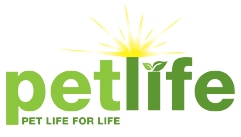Pet Obesity has risen sharply in the United States and is the most common nutritional disorder that affects cats and dogs today. It is estimated that 30 to 50% of pets today are overweight, mirroring obesity trends in humans (currently at 60% and rising). Much as it is in humans, obesity in pets leads to a myriad of other health problems, including wear on the joints and arthritis, heart problems, diabetes, cancer and a decreased life span. In most cases pet obesity can be attributed to a simple equation: Too Many Calories + Wrong Type of Nutrition = The Pet Obesity Epidemic.
Causes of Obesity in Pets
The causes of obesity in pets are varied and often interrelated, which can lead to a compounding effect. These causes include:
Overfeeding. Feeding your pet too many treats or providing scraps from the table is all too common, and is equivalent in humans as having dessert or a few extra beers. Over time, too many calories add up to excess weight.
Lack of exercise. As in humans, insufficient exercise for your pet means that more calories are being turned into fat rather than burned off. Nowadays, the trend is only getting worse, since pet owners have less and less time to care for and exercise their pets regularly and for adequate intervals.
Malnutrition. Nearly all commercial pet food on the market today is mass-produced by large companies who may or may not necessarily utilize the highest quality ingredients available. Convenience and cost considerations have led to widespread use of wheat, corn, soy or casein products as primary ingredients, rather than the quality meat, vegetables, fruit, nuts, seeds, berries and clean fresh water that animals have been eating for centuries. Many ingredients in todayís pet food can be linked to allergies and intolerances, as evidenced by skin conditions, respiratory problems and behavioral problems. The common practice of adding fillers and preservatives in the food production process, along with the reduction of quality fiber, has been implicated in causing hormonal imbalances that often lead to metabolism damage.
Assessing your petís healthy weight level
A veterinarian will be able to assess the level of obesity in your pet by several indicators. There are simple visual scales used in routine physical exams that look at prominence of ribs and fat over certain key areas of the body. Your vet should also work with you to construct a diet history, including feeding times and amounts, measurement of food, exercise, type of food, and any changes made periodically to diet. Based on this information, your veterinarian can apply several equations to determine the ideal weight for the pet and then decide how best to proceed. Veterinarians may also augment this information with blood work to determine any medical conditions or nutrient deficiencies.
Reversing your petís obesity equation
As an outcome of your petís evaluation, your veterinarian may recommend re-establishing proper nutritional balance for your pet in addition to monitoring caloric intake and establishing a regular exercise routine.
Two potential approaches to achieving nutritional balance are:
Augmenting your petís current diet with supplements, or
Completely overhauling your petís diet
Supplements, particularly those that provide essential fats, antioxidants, fiber, and digestive enzymes, may address specific nutritional issues, fill nutrient gaps from your petís existing diet, and provide similar benefits to that of synthetic vitamins without the inherent side effects of synthetics. Alternatively, starting an entirely new diet regimen for your pet may be recommended; a whole food diet combined with optimal levels of essential fats and non-allergenic fiber can serve as a solid dietary foundation for changing your petís metabolism and providing proper digestion. Coupled with intake management and exercise, these approaches may aid in helping your pet achieve a maintainable healthy weight level, thereby changing your petís obesity equation Ė for good.
As always, we recommend that before making any changes concerning your petís health or embarking upon a dietary regimen of any kind, please consult your veterinarian ahead of time to ensure that it will meet your petís individual and unique needs.
<< Back to Pet Health Articles
* These statements have not been evaluated by
the Food and Drug Administration. This information is not intended to
diagnose, treat, cure, or prevent any disease.



